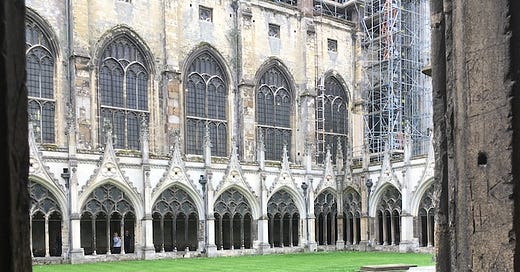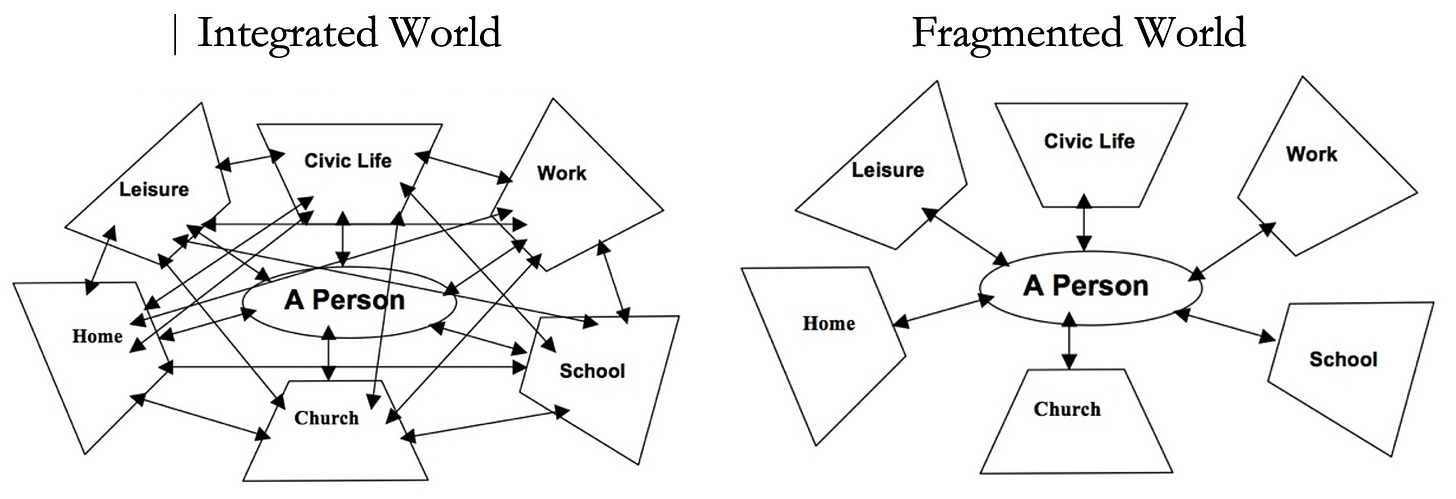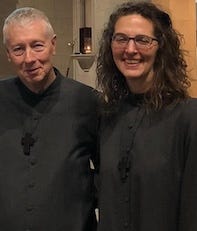Organizations in a World of Choices
People need to see the parish as a resource for making sense of, and navigating, their world
From time-to-time we’ll offer a reprint from another blog or a section of a book. This piece comes from Finding God in All Things: Contemplation, Intercession, and Intervention, Michelle Heyne, OA & Robert Gallagher, OA, Ascension Press, 2023. Here we are sharing parts of a section from the chapter on “Change Forces and Strategies.”
From an integrated and limited world to a fragmented world
This model describes America’s movement from an integrated and limited world to a fragmented world with many choices. It’s based on Doug Walrath’s writing in Frameworks. [1] The world that most Episcopal churches live in changed between the period prior to and after 1945.
The end of the Second World War brought considerable change to the nation. Prior to the war the elements of most people’s life were in organic relationships. They were engaged in mutual adaptation with each other. No one would consider having a Little League game on Sunday morning, because it was understood that people were attending worship (or would think they should be). A clergyperson visiting the local school would seem normal. Businesses were usually closed on Sundays because of social norms and in many cases blue laws. There were fewer choices of what to buy and how to spend your time. Most people grew up, went to school, lived in the same town or neighborhood, and worked for the same organization their entire life. Society tolerated a few “odd” people (to the extent they are “our odd people”). Others were excluded because they were simply too “different” based on the norms of that time.
After the war things began to rapidly change. As noted earlier, there was more mobility. Many who had served in the military didn’t return to the old neighborhood but started families in the new suburbs. Each element of life began to have its own values and culture, and made independent claims on people’s time, money, and energy. There was more choice. Supermarkets became common, with a much wider range of foods. There was both more autonomy and greater anonymity. Life’s various sectors no longer took the desires and needs of the other sectors into account in the manner that had been true earlier.
We had moved from an integrated world to a fragmented world, from a self-integrating society to one that required negotiation, from limited choices about life and work to a wide range of choices. Increasingly “going to church” was an option, rather than an assumed behavior. The individual person now had to more intentionally decide how to use their time, spend their money, and identify themselves. Below is a diagram of the Integrated World and the Fragmented World.
A problem for the parish church in the “fragmented world” is that now the church is in competition with all the other sectors of society for people’s attention, attendance, energy, and money. So, a person might decide, “I can’t handle all this. I’m going to focus on some parts of life rather than others.” The easiest ones to set aside, for many people, would be civic life and church, and maybe fewer friends in their leisure time. There are several ways in which people have adapted to the fragmented world.
Acting as if nothing’s changed
Withdraw from segments where stress is the greatest
Restrict ourselves (relationships/physical space) related to where we live
Choose one segment and devote as much time as possible to it
How have various organizations, including parish churches, dealt effectively with the fragmented world?
The parish can try to be an integrated culture that is also open to the world.
The parish can acknowledge that many people’s commitments will be short term given the increased mobility, flexibility, and other demands of their lives. At the same time, the parish needs structure, so we can quickly include people in leadership and teams, while recognizing fewer people will maintain long-term or lifelong relationships with particular organizations, including parishes.
The parish can take on the task of assisting people to live integrated lives in a fragmented world.
The parish can function in a manner that takes into account the fragmentation of people’s lives, and respond in such ways as providing childcare for some events and meetings; for those wishing to participate in weekday and special occasion worship, asking for their schedule preferences; and intentionally building relationships among people by including brief connecting activities and social times during midweek events.
The parish can seek appropriate relationships with other sectors of people’s lives.
The response of some in the church has been to double down on exhortation (more repetition of what people “should” or “must” do). The reaction in other parts of the church has been to loosen or eliminate expectations of membership (more repetition that “all that matters is Love,” or to “be a good person”). One demands a certain kind of discipleship for inclusion, and the other reduces the challenges of faithful practice or pretends that inclusion is a one-way street. The one would make us a pure sect. The other would turn us to mush. Both sides have their anecdotes to illustrate why their approach is best. We think it’s an argument that may all too often align with people’s political views. In any case, it doesn’t address the actual situations we face. Doing so requires a bit more thought and discipline and so we’d suggest a different way forward that takes into account both the complexity and the need for persistence.
In the book there is material in this location explores several options for addressing the issue. We continue with a suggestion for stances a parish might take.
See the parish as a resource
People need to see the parish as a resource for making sense of, and navigating, their world. That involves helping people shift from seeing the parish as a competitor with all the other sectors of life. Put another way, if the parish is just one more institution wanting my time and money, then I’m going to prioritize. And the church will often lose out in that process. What steps might your parish take to be seen as a means to a better life? What are steps that guide the believer seeking faithfulness and integrity? Here’s a place to begin.
Stress the primary ministry of the baptized
The calling of the baptized is to be instruments of God’s love in family, with friends, in the workplace and civic life—that’s where they live. That’s what’s primary for most people. It is how God works; how, as William Temple said, “The stream of redemptive power flows out from the church through the lives of its members.” This means parish leadership, and especially the priest, need to keep this fundamental fact in front of the parish community. So, fewer stories about when the rector was in seminary and more stories about how God works through us in the circumstances and people of our daily life. Less teaching about the holy bishops and priests in the calendar and more about the holy laity. It means changing the website so there is a section called something like “ministry within the parish” (including vestry, committees, parish service projects, and other areas) and another section on the ministry of the baptized (such as an article on the Renewal—Apostolate Cycle and stories of daily life loving and serving, including information about parishioners’ work lives).
Sidney was a church member and served on the public school board in Trenton, which took up a lot of his time and energy. The vestry of his parish church needed someone to fill a vacancy, and naturally enough his name was suggested as a wonderful addition. The vicar went to Sidney to talk about the possibility. The vicar had once worked for an industrial mission and he knew that Sidney’s school board work was an example of Pope John XXIII’s view of the ministry of the laity: “They must involve themselves in the work of these institutions, and strive to influence them effectively from within.” [ii] As expected, Sidney was torn. He wanted to serve the parish, but he worried about the impact of the vestry commitment on his family and the city’s educational system. The vicar told Sidney about the thinking of Temple and the Pope. The rector made it clear that what Sidney did on the school board was a vital act of ministry. It was true stewardship. Sidney was relieved, said no to the vestry at this time, and the parish managed well with a vacant vestry slot that year.
The section concludes with two additional stances that a parish could assume.
.
This abides,
Sister Michelle, OA & Brother Robert, OA
The Feast of William White, Bishop of Pennsylvania, 1836
About Brother Robert, OA & Sister Michelle, OA
[i] Doug Walrath, Frameworks, Pilgrim Press, 1987. The 1985 continuing education week of the Order of the Ascension was led by Doug Walrath. The topic was small parish dynamics and research. He shared a good bit of what was to appear in Frameworks a couple of years later. Doug had been the executive of a reformed church and was at the time of our gathering the Director of the Small Church Leadership Program and Professor of Pastoral Studies at Bangor Theological Seminary. Doug’s thinking about integrated and fragmented worlds had a significant impact on the work of the Order in the years following.
[ii] Pope John XXIII, “Here once more We exhort Our sons to take an active part in public life, and to work together for the benefit of the whole human race, as well as for their own political communities. It is vitally necessary for them to endeavor, in the light of Christian faith and with love as their guide, to ensure that every institution whether economic, social, cultural or political, be such as not to obstruct but rather to facilitate man’s self betterment, both in the natural and in the supernatural order … And yet, if they are to imbue civilization with right ideals and Christian principles, it is not enough for Our sons to be illumined by the heavenly light of faith and to be fired with enthusiasm for a cause; they must involve themselves in the work of these institutions, and strive to influence them effectively from within.” Pacem in Terris. Encyclical on Establishing Universal Peace in Truth, Justice, Charity, and Liberty. April 11, 1963.






